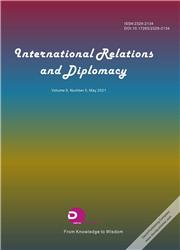Terrorist Framework and Inclination: The Behavourial Pattern of Boko Haram in Nigeria
引用次数: 0
Abstract
Boko Haram has become a household name in Nigeria, Africa and globally. In Nigeria, people refer “Boko Haram” to persons who threaten others or cause others to panic. In public and private spheres, people scamper for their live at the shout of “Boko Haram”! These describe the level of insecurity and security alert that Boko Haram has occasioned in Nigeria. Alert, not in the sense of responding to ensured security, but rather in the sense of a level of consciousness devoid of security and safety―a reaction to hopeless situation. This is because the security personnel (police or military) has never prevented attacks or raids by Boko Haram or known to have carried out any swift operation to rescue victims of attacks or raids. The last two decades (more since 2012) has witnessed a collapse of national and sub-regional security owing to the activities of Boko Haram. The security situation has continued to degenerate, despite national, regional, and international efforts to contain the threats and activities of Boko Haram. Boko Haram has carried out more than 330 successful attacks and raids, more than 50 suicide attacks, destroyed more than 20 national and international symbols, Since 2011, the sect has withstood Nigeria’s military and defense strategies with equanimity, claiming more than 200 Nigerian plus 92 military Chadian personnel, capturing and destroying more than $200 million worth of military equipment. Military installations, open markets, religious-worshipping houses, government and defense institutions have remained consistent targets for Boko Haram’s attack. The level of attacks, intelligence and near unbeatable approach being displayed by Boko Haram situate Boko Haram in de broader framework of international terrorism and depict a high level of negligence or compromise from the security institutions and the Nigerian state. The swapping of captives, striking of deals, negotiated release of Boko Haram captives, attempts at general or selected amnesty, and the huge benefits of political economy of terrorism equally suggest that Boko Haram has not only been an enemy, but a veritable partner of the Nigerian State, with its defeat not foreseeable anytime in the near future.恐怖主义的框架与倾向:尼日利亚博科圣地的行为模式
博科圣地已经在尼日利亚、非洲和全球家喻户晓。在尼日利亚,人们将“博科圣地”称为威胁他人或引起他人恐慌的人。在公共和私人领域,人们在“博科圣地”的呼喊声中逃命!这些描述了博科圣地在尼日利亚引发的不安全和安全警报的程度。警惕,不是对确保的安全做出反应,而是对缺乏安全感的意识水平——对绝望情况的反应。这是因为安全人员(警察或军队)从未阻止博科圣地的袭击或突袭,也从未迅速采取行动营救袭击或突袭的受害者。过去二十年(自2012年以来),由于博科圣地的活动,国家和次区域安全崩溃。尽管国家、区域和国际努力遏制博科圣地的威胁和活动,但安全局势仍在继续恶化。博科圣地已经实施了330多次成功的袭击和突袭,50多次自杀式袭击,摧毁了20多个国家和国际象征。自2011年以来,该教派平静地经受住了尼日利亚的军事和防御战略,声称有200多名尼日利亚人和92名乍得军事人员,缴获并摧毁了价值超过2亿美元的军事装备。军事设施、开放市场、宗教礼拜场所、政府和国防机构一直是博科圣地袭击的目标。博科圣地所表现出的攻击、情报和近乎不可战胜的方法将博科圣地置于更广泛的国际恐怖主义框架中,并描绘了安全机构和尼日利亚国家的高度疏忽或妥协。交换俘虏、达成协议、谈判释放博科圣地俘虏、试图大赦或选择性大赦,以及恐怖主义政治经济的巨大利益,都表明博科圣地不仅是尼日利亚国家的敌人,而且是尼日利亚国家名副其实的伙伴,其失败在不久的将来是不可预见的。
本文章由计算机程序翻译,如有差异,请以英文原文为准。
求助全文
约1分钟内获得全文
求助全文

 求助内容:
求助内容: 应助结果提醒方式:
应助结果提醒方式:


